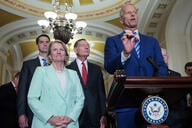You have /5 articles left.
Sign up for a free account or log in.

Colleges have received billions from foreign entities, and lawmakers say they aren’t fully complying with a law that requires them to report those gifts.
Photo illustration by Justin Morrison/Inside Higher Ed | mirza kadic and tarras79/iStock/Getty Images
Colleges and universities should brace for another round of federal funding attacks as President Trump targets colleges that fail to report possible “foreign influence,” higher education experts warn.
Late last month, Trump directed the Department of Education to ensure it is enforcing Section 117 of the Higher Education Act—which requires institutions to disclose certain international gifts—as part of an executive order aimed at ending “the secrecy surrounding foreign funds.”
Trump wrote in the executive order that he also wanted to “protect the marketplace of ideas from propaganda sponsored by foreign governments, and safeguard America’s students and research from foreign exploitation.” But higher ed policy analysts, legal consultants and lobbyists say the order is a messaging tactic that shows the administration sees Section 117 as another way to target colleges.
“If there’s a national security concern for institutions, we want to be partners in trying to address it, but we want to understand how our institutions can be in compliance, so that it’s not a gotcha situation,” said Sarah Spreitzer, assistant vice president of government relations at the American Council on Education.
Republicans have raised concerns for years about how gifts from foreign entities such as China and Russia could harm national security. They also criticized colleges for not disclosing foreign gifts and contracts, arguing that the money flowing to American higher education gave certain countries undue influence over campuses. Colleges reported 5,600 foreign gifts and contracts to the federal government last year, according to data released in November. The transactions totaled $4 billion; the largest gifts or contracts came from Bermuda, Canada, Germany, Japan and Qatar.
Trump prioritized Section 117 enforcement during his first term, launching 19 investigations. Reports found that fewer than 300 colleges and universities had historically reported gifts in compliance with the law.
And while colleges could legally lose access to federal student aid because of a failure to comply with Section 117, no institution has yet to face that penalty. But enforcement this time around could carry more risk for colleges, as this administration has shown itself to be more willing to pull a college’s federal funding.
Already Trump’s administration has opened two investigations into alleged underreporting of foreign gifts, accusing Harvard University and the University of California, Berkeley, of not complying. Spreitzer and other experts say colleges should prepare for more investigations.
“I think given the executive order and the current interest in Section 117, I would encourage all institutions to review their compliance, as I hope they do on a regular basis,” she said.
The Education Department didn’t respond to a request for more information about its enforcement of the law.
Other Funding at Risk
Under Section 117, all colleges and universities must disclose to the federal government twice a year any gifts they receive from a foreign organization worth at least $250,000.
And while most of Trump’s recent order simply stresses the department’s duty to prioritize enforcement, one snippet raises particular concern.
The order allows Education Secretary Linda McMahon and other “appropriate” cabinet members to withdraw any “appropriate federal grant funds” if colleges fail to comply with Section 117 or any other “applicable foreign funding disclosure requirements.” (Other requirements could include foreign funding regulations set by the National Institutes of Health, the National Science Foundation and the Department of State, among other agencies.)
Historically, investigations that identified a college’s failure to report qualifying gifts were resolved with a voluntary settlement. And the funding at risk was an institution’s eligibility for federal student aid. But this order could put other sources of funding at risk, as has been the case with many of Trump’s other investigations into colleges so far.
“The last thing I want to do is cause a huge sense of alarm,” said Amanda Ferguson, senior director of education and research business at Huron Consulting Group. “But I think the administration with all of its activity over the first [100 days] has signaled a willingness to hold universities in public and ask about what they’re doing with some of these larger-scale priorities.”
‘Operating in a New Era’
The order justified its directives using the False Claims Act, a federal law that prohibits the submission of false or fraudulent claims of payment to the government and allows for both civil and criminal enforcement if violated.
But Ferguson and Spreitzer questioned this argument.
“This report doesn’t have anything to do with money that you’re drawing from the government,” as would seem to be necessary for conviction under the False Claims Act, said Ferguson. “It’s just reporting money that you’ve received from other people, so we still have yet to see how they’re planning to do that.”
Ferguson said it’s hard to say whether expanding the fiscal penalties beyond federal student aid is legal.
“We’re operating in a new era with the administration,” she said.
Spreitzer said ACE doesn’t oppose requiring colleges to report donations or penalizing those that don’t comply. But enforcement of Section 117 is relatively new, and the department has shared little guidance about how to comply. She’s worried that the order could lead the department to impose funding cuts without first notifying colleges of their violations and giving them a chance to resolve the error.
“If [the executive order] is a way to go after institutions who may not even have understood how they were supposed to be in compliance … I don’t think that’s going to be very helpful in either making it more transparent or encouraging our institutions to report foreign gifts and contracts,” Spreitzer said.
‘Long Overdue’
A few higher education groups, including the National Association of Scholars, a conservative education advocacy group, say the order sends a strong message to colleges about the importance of disclosing gifts.
“The Trump administration’s executive order is long overdue. Our colleges and universities have sold out the American taxpayer for foreign dollars,” NAS spokesperson Chance Layton said. “We welcome the reinvigorated focus on this issue and encourage Congress to pass the DETERRENT Act,” a piece of legislation that would require colleges to start reporting most gifts at the $50,000 threshold.
NAS is hoping the Trump administration will quickly restore a publicly available, searchable database of the reported gifts. The database launched in 2020, but the Biden administration decommissioned it last year, providing quarterly reports instead. To gather more insights into foreign gifts, NAS created its own database in 2021.
The group’s research into foreign gifts showed that before the first Trump administration, from 2010 to 2016, universities failed to disclose 54 percent of all reportable gifts. Then, during the first Trump administration, colleges went above and beyond and disclosed $1.7 billion more in funding than was required under the law. But under the Biden administration, the report states, universities “returned to the status quo”—reporting at least 39 percent fewer of the gifts than were mandated. (Spreitzer at ACE said she didn’t think colleges reported gifts differently across administrations.)
The executive order and NAS criticized the Biden administration’s approach to Section 117 and questioned whether Biden was properly preventing foreign influence over higher education institutions. But former Biden administration officials have defended their handling of Section 117, pointing to an increase in the number of gifts reported.
Need for More Clarity
But most higher education stakeholders say that given the lack of guidance on how to best comply, the Trump administration’s impending crackdown is uncalled-for—especially if colleges aren’t first notified of violations and given a chance to comply.
“My fear here is that Section 117, historically, has been a very overlooked law,” said Jeremy Bauer-Wolf, the higher ed investigations manager at New America, a left-leaning think tank, and a former Inside Higher Ed contributor. “That creates a rife situation for it to be abused, because a lot of folks don’t understand at either the federal government or the college level.”
Shortly after Trump signed the executive order, the department announced the Berkeley investigation. Department officials said that local reporting showed that the university received “hundreds of millions of dollars” from foreign donors, particularly China, that had not been properly reported. Most of the funding went toward technological innovation that could be problematic if intercepted by the Chinese government. Berkeley didn’t respond to a request for comment prior to publication.
Bauer-Wolf is concerned that much like Columbia University was a test case for antisemitism investigations, the administration could be looking to make an example out of Berkeley.
“UC Berkeley is a good target, because they did have a very legitimate Section 117 case. I think it’s very possible that they could use that to try to get concessions out of Berkeley,” he said. “The goal for the administration here has not been compliance on many issues. It has been punishment. And so I just have a lot of skepticism that this policy would actually be used for its real intended purpose.”




